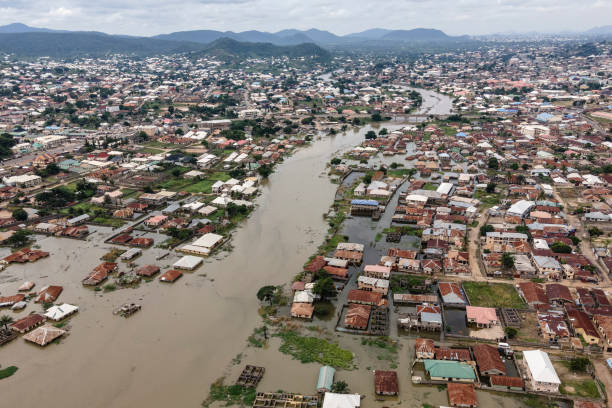
•Delta community submerged
No fewer than five million Nigerians have been displaced by flooding in about a decade. Data by the Office for Strategic Preparedness and Resilience (OSPRE) disclosed this, covering 2012 to 2022.
The estimate emerged just as the Ewulu community, with adjourning areas in Aniocha South Local Council of Delta State, got submerged by rising floodwater.
The tragedy occurred despite repeated government warnings for residents in flood-prone coastal regions to relocate to higher plains. According to findings, the majority of the five million displaced persons are not accounted for in any IDP camp as they simply moved into other communities, putting stress on social infrastructure and potentially leading to conflict because of heightened competition for resources.
The Director-General, Office for Strategic Preparedness and Resilience (OSPRE)/National Centre for the Coordination of Early Warning and Response, Chris Ngwodo, who disclosed this at the Youth Pre-Conference segment of the Future of Health Conference 2024 organised by Nigeria Healthwatch, yesterday, in Abuja, observed that the country was witnessing a lot of flooding, high prevalence of cholera and other deadly waterborne diseases.
He said: “When we think of this number, 500 million persons, it can be a bit abstract. But I think for perspective. What I would like to say is that the population of Botswana is two million people. So, we think of it as the displacement of the population of a small country within our population.”
In her welcome address, the Managing Director of Nigeria Health Watch, Vivianne Ihekweazu, said “climate change is not just an environmental issue, but also a health crisis that is already threatening the well-being of communities” across Africa.
Ihekweazu observed that rising temperatures, shifting weather patterns and increasing natural disasters were exacerbating health vulnerabilities whether through the spread of infectious diseases, food and water insecurity, or the strain on the already fragile health systems.
Speaking on ‘Amplifying Youth Voices for Climate Action’, the Managing Director of Society for Family Health (SFH), Dr Omokhudu Idogho, who noted climate crisis as a health crisis, lamented that climate-related humanitarian emergencies were increasing in scale, frequency, and intensity.
He pointed out that climate justice required a people-first approach, and that youth advocates deserve to have their voices heard on policies that directly impact their livelihood.
According to local sources, the Ewulu flooding, a yearly occurrence, has taken over the main access road linking the community, thereby posing a significant threat.
The floodwaters were rising quickly and were expected to soon reach homes near the Umuomi River, which serves as a flood channel for the area. Visitors to Ewulu have to go through the neighbouring town of Isheagu, a longer route, since many still remain in the area despite these warnings.
A resident of Ewulu, Andrew Uchendu, called on the Delta government to urgently assist those living in lower plains, explaining that with the main access road submerged, residents face higher transportation costs and difficulties reaching their homes.
“The flooding of the main road means it is only a matter of time before the water reaches the coastal areas where many of our people live. The sooner the government stepped in, the better for our community,” Uchendu said. He advocated establishing Internally Displaced Persons (IDPs) camps to accommodate those affected. “Planning for such camps now would help ease the situation for those at risk,” he stated.



